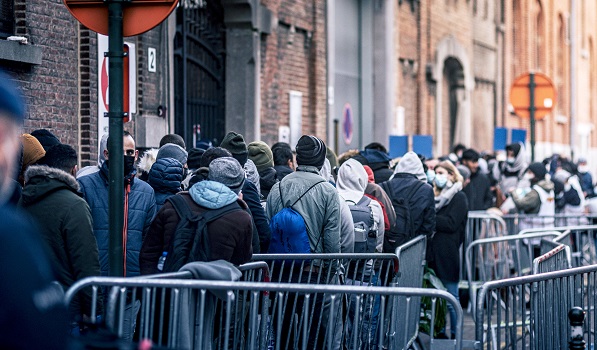On 16 December Belgium signed an operational plan with the European Asylum Support Office (EASO) for support in the form of “reception assets and equipment, personnel and technical expertise” to assist Belgian asylum authorities in dealing with the ongoing reception crisis in Brussels – the capital of the EU – and the country.
Belgian Secretary of State for Asylum and Migration, Sammy Mahdi, and the EASO director Nina Gregori signed the operational plan on 16 December for support to begin in January 2022. EASO “will work with Fedasil in terms of increasing short and medium-term capacity while ensuring that reception standards are in line with the Common European Asylum System (CEAS)”. Support will address “emergency reception needs” as well as “increase[ing] reception capacity”. EASO will provide up to 150 reception units in the coming months, possibly supplemented by additional units. 100 EASO personnel will be deployed, including site managers, information provision experts, social workers, child protection experts, and interpreters.
The occupancy of the Belgian reception system roughly doubled between the summer of 2018 and the beginning of 2020, from 16,000 to over 29,000 persons. The occupancy rate reached a high of 96 per cent in September 2019. While the number of asylum seekers stabilised in 2021 at around 24,000, the reception needs continue to exceed capacity. The Petit Château centre in Brussels is the only place to apply for asylum in Belgium and an asylum application is a pre-condition for reception support. As the centre lacks capacity to process applications thousands of people have been destitute and sleeping rough over the past months. Hundreds remain in the streets of the EU capital: for instance, ECRE member Flemish Refugee Action reported of 150 people and 65 people unable to submit applications on 13 and 16 December respectively. The organisation also reports that under-aged youth have in some cases been removed from the line for minors, as they were assessed to be above the age of 18. NGOs and the city of Brussels have ensured hotel accommodation for some of the many people and on 8 December BXL Refugees, Fedasil, and Médecins Sans Frontières managed to mobilise temporary host families for nine unaccompanied children who had been queuing outside the Petit Château centre but found no available reception places.
On 9 December hundreds of people including Fedasil workers attended a protests outside Sammy Madhi’s office, using the hastag #SammyWakeUp. On the sidelines of the demonstration, NGOs met Mahdi but expressed disappointment when he rejected proposals on viable alternative accommodation schemes. The minister however declared that 1,000 reception places were created in November, as well as 400 a week over the past weeks. The establishment of an extra reception centre in the vacated hotel Mercure in Evere has been announced, but a lack of remains on the capacity: Mahdi claims it will host 480 people while the municipality refers to a capacity of just 120.
The Council of the EU on 9 December adopted the regulation that will transform EASO into a fully-fledged EU agency. According to a published statement: “The new legislation increases the agency’s support to cooperation among member states and third countries, thereby also contributing to the solidarity among member states and the EU overall external dimension. It also takes into account that discussions on a new migration and asylum pact are ongoing and defers the entry into application of the monitoring mechanism to a later stage.” Aleš Hojs, Minister for the Interior in Slovenia currently holding the presidency of the Council called the decision: “an important step in the building of our common EU asylum policy”.
For further information:
- ECRE, Belgium: Accommodation Shortage Leaves Men in the Cold, Court Insists on Reception Conditions, Charities Launch Judicial Challenge, Media Access Curtailed, December 2021
- ECRE, Belgium: Asylum Seekers (Once Again) Left Destitute, October 2021
Photo: Vluchtelingenwerk Vlaanderen, November 2021
This article appeared in the ECRE Weekly Bulletin. You can subscribe to the Weekly Bulletin here.

